Nigerian multistakeholder platform members pay a visit to the House of Representatives and Senate
28 March 2023
Project Name
Integrated Landscape Management to Enhance Food Security and Ecosystem Resilience in Nigeria
GEF Implementing Agency
UNDP
Objective
To foster sustainability and resilience for food security in Northern Nigeria through addressing key environmental and socioeconomic drivers of food insecurity across three agro-ecological zones.
Project Targets
land under integrated and sustainable management
GHG emissions avoided or reduced
beneficiary households
The Nigerian economy is dominated by the agriculture sector, which is the main source of livelihood for the majority of the population. However, multiple factors contribute to low agricultural productivity and resulting food insecurity, including limited use of irrigation and technology, high cost of farm inputs, and poor access to credit and markets.
Overharvesting of natural resources has led to increasing environmental degradation and high levels of deforestation in Nigeria. The challenges posed by a degraded environment will be further exacerbated by climate change, which is predicted to intensify the frequency of droughts and floods in Nigeria, with resulting crop and livestock losses, and further land and forest degradation.
The RFS Nigeria project supports a process of agricultural transformation in 70 communities in 14 Local Government Areas of northern Nigeria, and in three different agroecological zones: Guinea savannah of the north central region, Sudan-Sahel savannah of the northwest region, and Sudan savannah of the northeast region. The Theory of Change is based on the recognition that food security is the product of both socio-economic and environmental factors.
Addressing these factors requires both coherent policies and institutions that influence the ability of farming households to foster sustainable food security and tackling critical shocks in order to enhance the resilience of food production systems. A landscape approach, integrating resilience of land use systems, natural resource management and livelihood security, is of key importance.
The project is delivered through three interrelated components:
The project aims to meet the following targets:
Institutional and policy environment for achieving improved food security is enhanced.
Sustainable agricultural practices and market opportunities for smallholder farmers are scaled up.
An effective and functional monitoring, assessment and knowledge-sharing system is established.
The RFS Nigeria’s lead national partner is the Federal Ministry of Agriculture and Rural Development who will chair the project steering committee. Other participating ministries include those in charge of the environment, water resources, women’s affairs, and budget and planning. State and local governments from the seven participating states are supporting the implementation of the project. In addition, CSOs, universities, and research Institutions are involved in advocacy, mobilisation, training, research, technical input and knowledge sharing.
Each RFS country project conducts activities that fall under common thematic areas within the programme. Explore each project theme relevant to the RFS Nigeria country project below to see which activities are being implemented under each theme.
Stories from the Field
Explore our stories from the field to learn more about the activities, milestones, lessons learned, and achievements of the RFS Nigeria project.
Relevant Resources
We have a growing library of reports, briefs, case studies, media, tools and guidelines. Explore all resources related to the RFS Nigeria project to get greater insight into our programme activities.
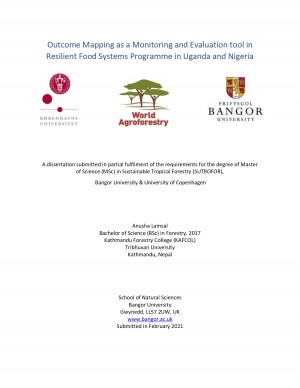
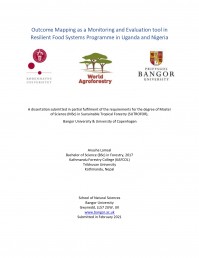
A dissertation submitted by Anusha Lamsal in partial fulfilment of the requirements for the degree of Master of Science (MSc) in Sustainable Tropical Forestry (SUTROFOR), Bangor University & University of Copenhagen.
ABSTRACT:
The Resilient Food Systems (RFS) programme aims to respond to chronic food insecurity and targets in fostering sustainability and resilience among smallholder farmers in 12 sub-Saharan African (SSA) countries. This research investigated the potential for OM methodology in the RFS project in the Karamoja subregion of Uganda and northern Nigeria. This qualitative study offered OM training sessions that trained the participants from both countries to identify project vision, mission, boundary partners, outcome challenges, progress markers, strategy maps, and organizational practices. The participants used OM methodology to track the behavioural change in the boundary partners involved in the RFS projects. Participants from both countries identified 4-5 important RFS project boundary partners that need behavioural changes and defined outcome challenges, progress markers and strategy maps for each of them. RFS Uganda identified Local Farming Communities (Smallholder farmers, women, and youth) who were also the ultimate beneficiaries, National Steering Committee, Local Government, Media, and the Implementing Partners as the most important BPs. Similarly, Smallholder farmers (women and youth), the Federal Ministry of Agriculture, ADPs of all 7 states, Private sectors, and Media were identified as the most important BPs by RFS Nigeria. This study concludes that OM methodology can be implemented to track behavioural changes in Boundary Partners involved in RFS projects. To incorporate tracking of behavioural change into the project monitoring and evaluation plan, it is important to configure and adjust OM methodology to the country’s specific contexts and phases of RFS projects. When continued in other RFS countries, it should incorporate gendered perspectives in every OM stage possible.
The data obtained during this thesis was mainly used to write this MSc dissertation. It was also used to contribute to a project report and research paper informing Uganda, Nigeria, and other RFS countries about project scaling and policy influence using OM as a method for Monitoring and Evaluation (M&E). This research contributes to the overall SSA Food Security and Sustainability Goals of the RFS as well as one of the objectives of ICRAF to address the Sustainable Development Goals (SDG) 2 aimed at ending poverty, achieving food security and improved nutrition and encouraging sustainable agriculture.
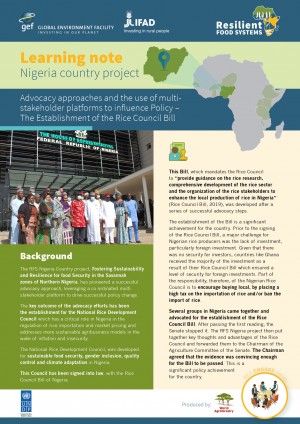
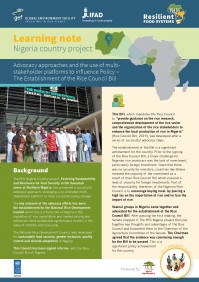
The RFS Nigeria Country project, Fostering Sustainability and Resilience for Food Security in the Savannah zones of Northern Nigeria, has pioneered a successful advocacy approach, leveraging a coordinated multistakeholder platform to drive successful policy change. The key outcome of the advocacy efforts has been the establishment of the National Rice Development Council which has been signed into law with the Rice Council Bill of Nigeria. This Learning Note shares insight into the process and tips for sustainability and scalability for similar advocacy initiatives.
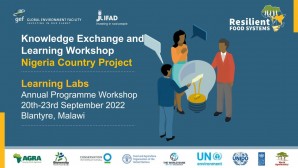
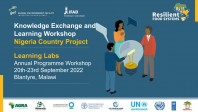
The RFS Nigeria team is enhancing the policy environment by establishing multi-stakeholder platforms to achieve long-term sustainability and resilience of food production systems in Nigeria.
This presentation was part of Learning Lab 4: Building resilient value chains of the 2022 Resilient Food Systems Annual Workshop in Blantyre, Malawi.